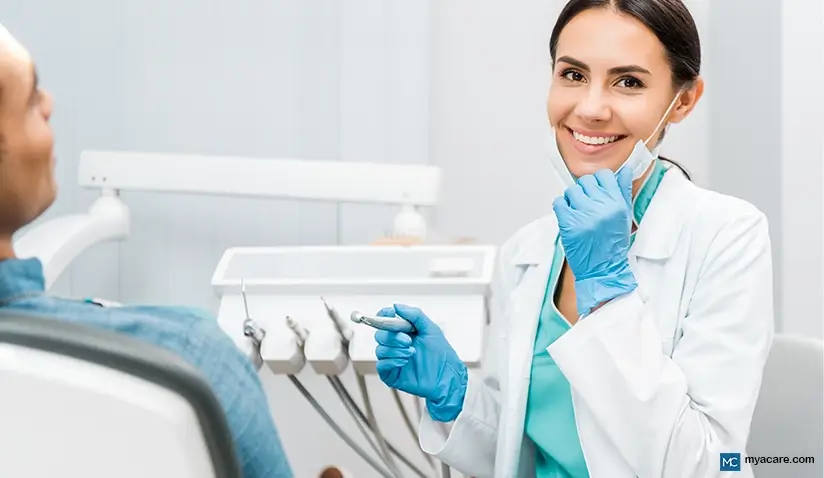Frequently Asked Questions to Dentists

Article Updated 28 July 2021
In this article, we get you answers to questions that are frequently asked to dentists. If you are curious about how to prevent gum infection, fix sensitive teeth, whiten teeth, or ensure oral hygiene, read on.
How Often Should I Visit the Dentist for Routine Checkup?
An annual visit is recommended. Based on the severity of dental problems, the dentist may recommend more frequent visits (e.g., every 3 or 6 months).
How Long Should I Brush My Teeth?
It is recommended to brush twice daily for a maximum of 2 minutes per session.
How Often Should I Change My Toothbrush?
The American Dental Association (ADA) recommends changing the toothbrush once in three months.
What Type of Toothbrush Should I Use?
Toothbrushes are classified as hard, medium, soft, and extra soft, based on the thickness of the bristles. A toothbrush with ‘soft’ bristles is recommended for individuals with a healthy mouth. For better access to teeth, toothbrushes with a small and compact head are recommended. The use of hard or medium toothbrushes may damage teeth and gums. ‘Extra soft’ brushes are recommended only in individuals with gum-related problems.
Which Toothpaste Should I Use?
A fluoride-based toothpaste is recommended for regular use in adults and children. For specific conditions such as gum infection or sensitivity in teeth, a different toothpaste may be recommended by the dentist.
Toothpastes are commercially available in paste and gel forms. The gel form has less abrasive material (helps in cleaning teeth) than the paste form. However, there is no difference in the cleaning efficacy of the two. Contrary to popular belief, the brushing technique plays a more important role than the brand or type of toothpaste.
How Often Should I Floss My Teeth?
ADA recommends flossing of teeth once a day to clean the food present between the teeth. Flossing can be performed by passing dental floss (nylon thread) between the teeth in an up-down motion. While it can be performed either before or after brushing, flossing before brushing is more effective. To make flossing more convenient, individuals can use the dental floss with a holder.
Is it Safe to Use a Mouthwash Every Day?
The rinsing with mouthwash helps in cleaning of areas in the oral cavity that are inaccessible to the toothbrush. Regular use of commercially available mouthwashes can help eliminate the bad breath. Besides regular mouthwashes, medicinal mouthwashes can be used for specific conditions such as gum infections, severe bad breath, dryness of mouth, and oral sores. These medicated mouthwashes are to be used for a limited duration, as recommended by the dentist.
What is the Best Method to Brush My Teeth?
In adults, the modified bass technique is considered to be the best technique for regular cleaning of teeth. In this technique, the toothbrush is placed at an angle of 45 degrees to the gums with bristles on the gum line (between tooth and gums). Short, back and forth strokes are made followed by a sweeping motion: in a downward direction for upper teeth and in upward direction for lower teeth.
What Happens When You Over Brush?
Aggressive brushing of teeth can cause loss of enamel (outermost layer of tooth) from the tooth surface. Along with this, the gums may recede, exposing the root surface. This may cause sensitivity.
Why Do My Gums Bleed?
Bleeding and inflammation of gums (gingivitis) is commonly caused due to accumulation of deposits (tartar or plaque) on the surface of teeth and gums. This is likely due to inadequate brushing. The layer of deposits—comprising bacteria—causes gums to become red, swollen, and fragile. Fragile gums start bleeding even on slight provocation (e.g., while brushing or flossing). Treatment of bleeding gums at an early stage can halt the advancement to severe gum infection.
Besides plaque, additional risk factors associated with bleeding gums include hormonal changes, nutritional deficiencies (including vitamin C deficiency), presence of misaligned teeth, and genetic and systemic diseases (e.g., HIV, leukemia).
Why Do My Teeth Get Sensitive?
Teeth sensitivity is the sensation experienced while having anything that is hot or cold. Research suggests that more than 40 million people in the US complain of sensitivity every year.
The visible part of the tooth (crown) comprises 3 layers: outer enamel, dentin, and innermost vital layer known as pulp. In conditions where the enamel is lost for any reason, it exposes the surface of dentin. When this layer comes in contact with hot or cold food or drinks, it stimulates the underlying nerves to produce a sensation. Individuals may experience rapid, sharp pain for a short duration.
The enamel may be lost due to improper brushing or gum infection, chipped tooth, decay, or a fractured filling.
The sensitivity of the tooth can be temporarily managed by the use of a desensitizing paste (e.g., Sensodyne).
How Often Should I Get my Teeth Cleaned by the Dentist?
In individuals with healthy mouths, professional cleaning of teeth (scaling) is recommended once a year. In individuals with risk of developing gum infections, the dentist may advise a visit once in 6 months.
Individuals may complain of a tingling sensation or sensitivity after scaling, which usually subsides in a few days.
What Causes Tooth Decay?
Tooth decay is the damage caused by acids released by bacteria present in the mouth. Food particles or sugar stuck in teeth are a breeding ground for bacteria. These bacteria then ferment the food and produce acids which dissolves the minerals of the tooth. This leads to the demineralization of the surfaces of teeth which appear like black colored holes on the tooth surface.
How Can I Prevent Cavities or Decay and Maintain Oral Health?
Cavities can be prevented by taking the following measures:
- Brushing twice daily using a fluoride-based toothpaste.
- Flossing of teeth or use of other cleaning aids such as interdental brushes, water pick, or interdental sticks can further reduce the risk of decay.
- Rinsing of the mouth after every meal can prevent the accumulation of food particles.
- Consuming sticky and sugary foods during night should be avoided.
- Regular dental checkups and cleaning of teeth by professionals can be helpful.
Why Do I get Wisdom Tooth Pain?
A mild pain may be experienced during the eruption of a wisdom tooth. This is due to forces exerted by the wisdom tooth, which causes an outbreak of tissues to accommodate teeth in the oral cavity. Sometimes individuals complain of severe pain, swelling, and fever during the eruption of the wisdom tooth. This is mainly due to the continuous accumulation of food or debris between the erupting tooth and soft tissue (mucosa) present around the wisdom tooth. This causes accumulation of bacteria which leads to infection.
How Can I Whiten My Teeth?
The teeth whitening procedure (bleaching of teeth) makes teeth look visually brighter. It can be performed by dental professionals in the clinic or by individuals themselves at home (as per instructions given by the dentist). The effect of the procedure lasts for 3 to 36 months. It is recommended to take a dentist’s advice as bleaching may not be suitable for all types of discoloration. Research suggests the use of a high concentration of bleaching agents can cause changes in the tooth surface and increase tooth sensitivity.
Many household ingredients such as baking soda, charcoal, turmeric, and coconut oil are marketed as whitening agents, but their effectiveness does not have any scientific backing. However, whitening toothpastes recommended by the American Dental Association (ADA) can help remove external stains from the tooth surface.
What Oral Hygiene Precautions Should I Consider if I am Exposed to COVID-19, or Flu?
If you contract COVID-19 or flu, then your mouth becomes the reservoir of the virus. Hence, it’s essential to adopt adequate oral hygiene methods to reduce the viral load. Below are some of the precautions to consider:
- Brush and floss your teeth twice daily to maintain oral hygiene.
- Use a tongue scraper to remove the coating on the tongue.
- Do not keep toothbrushes of all family members in the same container to prevent cross-contamination (as microorganisms may spread to other cleaning devices when stored together).
- Avoid the use of the same tube of toothpaste within family members to avoid cross-contamination.
- Store your toothbrush with the brush head in an upward direction. It facilitates faster drying and reduces the spread of microorganisms.
- Avoid storing your toothbrush in toilets as they are a possible source of contamination with the virus.
- Disinfect the brush head with 0.2% povidone-iodine or hydrogen peroxide diluted at 1% for 1 minute. It helps to maintain the toothbrush clean.
- Change your toothbrush once you recover from COVID-19 infection or flu.
To search for the best healthcare providers offering dentistry, please use our search engine. We currently have providers in India, Malaysia, Singapore, Spain, Thailand, Turkey, the UAE, the UK and the United States
To search for the best healthcare providers worldwide, please use the Mya Care search engine.

Dr. Shilpy Bhandari is an experienced dental surgeon, with specialization in periodontics and implantology. She received her graduate and postgraduate education from Rajiv Gandhi University of Health Sciences in India. Besides her private practice, she enjoys writing on medical topics. She is also interested in evidence-based academic writing and has published several articles in international journals.
References:
Featured Blogs



